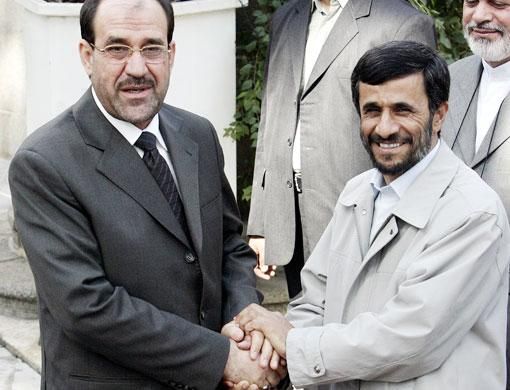Tehran: Iran offered yesterday to help establish security and stability in Iraq after Iraqi Prime Minister Nouri Al Maliki held talks in Tehran on his first official visit to the Islamic Republic.
Al Maliki's aides said he would tell fellow Shiite leaders in Iran that Tehran should not interfere in Iraqi affairs, a message likely to please Washington which accuses Iran of backing militants fighting US troops in Iraq.
But Al Maliki and Iranian President Mahmoud Ahmadinejad gave few details about their talks yesterday, except to say that the two neighbours which fought a bloody war in the 1980s had agreed to cooperate in political, economic and security fields.
"We will give our full assistance to the Iraqi government to establish security in [Iraq]. Strengthening security in Iraq means strengthening security and stability in the region," Ahmadinejad told a joint news conference after their meeting.
Al Maliki, speaking through a Persian translator, said: "This visit will be useful for cooperation between Iran and Iraq, in all political, security and economic fields."
The two sides signed an agreement covering these areas.
Shortly before starting the two-day visit, Iraqi government spokesman Ali Al Dabbagh told Reuters that Al Maliki would deliver a blunt message that Iran should not interfere in Iraq although he stopped short of endorsing US charges of Iranian "meddling".
"We want to pass a message to the Iranian leaders that Iraq needs good relations with neighbouring countries, without interference in our internal affairs," Al Dabbagh said.
Al Maliki will meet Supreme Leader Ayatollah Ali Khamenei, the highest authority in Iran, and influential former President Akbar Hashemi Rafsanjani today.
While officially encouraging Iraq's new ties to Washington's adversary, there is unease in the United States at Iranian influence over the Shiite leaders brought to power in elections that followed the US overthrow of Saddam Hussain.
Since forming a national unity government four months ago, Al Maliki has vowed to curb militant Shiite factions, some of whom also have links with movements in Iran, as part of efforts to avert civil war with Saddam's once-dominant Sunni minority.
In the latest violence, police and an Interior Ministry source said a car bomb targeting a passing US military convoy in west Baghdad killed six civilians and wounded over a dozen.













